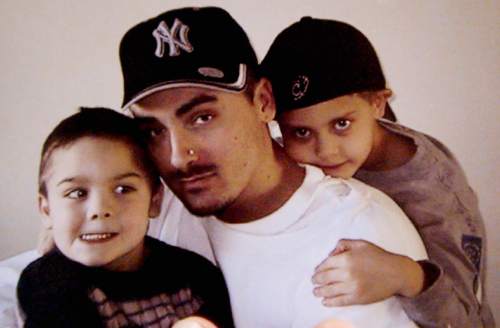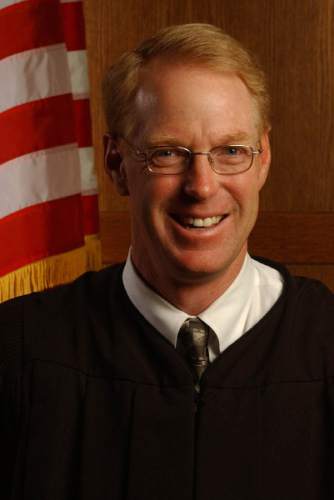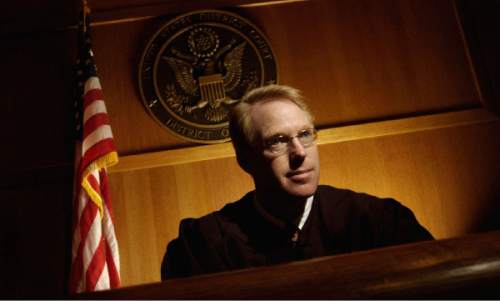This is an archived article that was published on sltrib.com in 2016, and information in the article may be outdated. It is provided only for personal research purposes and may not be reprinted.
A former federal judge is asking President Barack Obama to commute the "unjust, cruel and irrational" prison sentence he was forced to hand down to a Utah man 12 years ago.
In 2004, then-U.S. District Judge Paul Cassell sentenced Weldon Angelos, a music producer who had no prior criminal record, to a minimum 55 years in prison for gun-and-drug convictions for three times selling marijuana to a police informant.
"Two of those offenses occurred when Mr. Angelos carried a handgun to two $350 marijuana deals; the third when police found several additional handguns at his home when they executed a search warrant," Cassell wrote, quoting his own 2004 opinion on the case.
The severity of the sentence was required by law. The penalty for possessing a firearm during a drug transaction is a mandatory minimum sentence of five years for the first offense and 25 consecutive years for each subsequent transaction.
There is no parole in the federal system, which means offenders serve out their entire sentence, minus any "good time" credit of up to about 50 days a year they earn for their behavior in prison. Angelos has an estimated release date of Nov. 18, 2051, when he will be 72, according to records from the Bureau of Prisons.
Angelos' sentence did not sit well with Cassell, who is now a criminal-law professor at the University of Utah. In a letter he sent Tuesday to Obama, Cassell wrote that the case was "one of the most troubling that I ever faced in my five years on the federal bench."
Angelos, then 22, sold marijuana to a police informant three times in May and June 2002, each time charging $350 for 8 ounces. He was indicted in federal court on one gun possession count, three counts of marijuana distribution and two lesser charges.
Prosecutors alleged Angelos — the founder of Utah hip-hop label Extravagant Records and the father of two boys and a girl — was a gang member and drug dealer.
Angelos denied those accusations and declined a plea bargain offered by prosecutors. The U.S. attorney's office called the offer that Angelos rejected a "huge break," then obtained a new indictment with 20 counts that mandated a minimum 105-year sentence.
A jury convicted Angelos in 2003 of 16 counts of drug trafficking, weapons possession and money laundering. One charge was dismissed, and the jury acquitted Angelos of three other charges.
After handing down the 55-year mandatory prison term in connection with the weapons-related convictions, Cassell added one day for the 13 other counts.
Angleos' sentencing garnered national attention. A 2011 report by the U.S. Sentencing Commission used Angelos' case as an example of the "unduly severe sentences" produced by stacking mandatory minimum penalties.
In his letter to Obama, Cassell wrote that if his hands had not been tied by "draconian provisions," he would have imposed a substantially lower sentence that "would have likely led to him having already been released."
This is not the first time Cassell has asked for clemency for Angelos; he previously wrote to then-President George W. Bush. A group of former politicians, judges and prosecutors, scholars, and religious and business leaders also sent a letter to Obama in 2013.
Cassell said Tuesday he believes a clemency request has a better chance now than when he made the request to Bush.
"Twelve years have gone by and Weldon Angelos is now 12 years into his prison sentence," he said, adding the dozen years behind bars is a substantial amount of time to serve.
In addition, Cassell said, there is an ongoing review of clemency requests by the Obama administration in certain nonviolent cases, which should give Angelos hope.
"This was not a crime of violence," Cassell said, noting Angelos had a gun but did not use it.
Cassell — who said he resigned from the bench in 2007 to return to teaching law and to work on behalf of crime victims — wrote in his letter that "unduly long sentences" can be harmful from a victim's perspective. On the same day he sentenced Angelos, Cassell said, he imposed a 22-year prison term in a second-degree murder case at the recommendation of prosecutors.
"When the sentence for actual violence inflicted on a victim is dwarfed by a sentence for carrying guns to several drug deals, the implicit message to victims is that their pain and suffering counts for less than some abstract 'war on drugs,'" Cassell wrote.
People who have asked that Angelos' sentence be commuted include former FBI Director William Sessions; Sen. Mike Lee, R-Utah; former U.S. Sen. Jake Garn, R-Utah; former Salt Lake City Mayor Rocky Anderson; former Utah Supreme Court Chief Justice Michael Zimmerman; former California Attorney General John Van de Kamp; and comedian John Oliver, who last year spotlighted Angelos' case on his HBO program, "Last Week Tonight."
Lisa Angelos, Angelos' sister, said Tuesday that all the support is helping the clemency effort. Angelos, a Sandy resident, said family members are excited about Cassell's letter and "really hopeful" that the sentence will be commuted.
According to his sister, Weldon Angelos, now 36, has earned a business degree, worked in the prison dental lab and done tutoring while serving his sentence at the federal penitentiary in Mendota, Calif.
Twitter: @MikeyPanda







